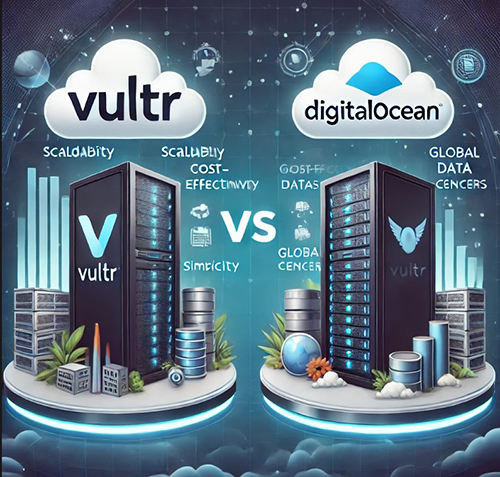Vultr vs. DigitalOcean: A Comprehensive Comparison of Cloud Hosting Platforms
Cloud hosting platforms have become essential for developers, businesses, and tech enthusiasts aiming to deploy applications and manage resources efficiently. Among the prominent players in the industry, Vultr and DigitalOcean stand out for their versatility and features. This article explores their offerings, comparing features, pricing, performance, and user experiences.

Introduction to Vultr and DigitalOcean
Vultr and DigitalOcean are both widely recognized for their developer-centric cloud hosting services. While both platforms cater to similar audiences, their unique features set them apart.
- Vultr is celebrated for its global infrastructure and scalable solutions tailored for diverse workloads.
- DigitalOcean shines with its simplicity and developer-friendly ecosystem, making it a favorite among startups and small-to-medium enterprises.
Feature Comparison
1. Server Deployment and Regions
- Vultr:
- Offers 30+ data center locations worldwide.
- Focuses on high availability and latency reduction.
- Customizable server options for different workloads.
- DigitalOcean:
- Operates 12 global regions.
- Provides standardized configurations for ease of use.
- Excellent for deploying straightforward, lightweight applications.
2. Developer Tools and Integrations
- Vultr:
- Advanced API for automation.
- Supports Kubernetes clusters and Bare Metal servers.
- Integrates with platforms like Terraform for DevOps workflows.
- DigitalOcean:
- Offers a comprehensive developer dashboard.
- Droplets (virtual private servers) tailored for simplicity.
- Managed Kubernetes, App Platform, and Database as a Service options.
3. Scalability and Performance
- Vultr:
- High-performance instances with NVMe storage.
- Optimized for compute-intensive tasks.
- On-demand vertical scaling for changing requirements.
- DigitalOcean:
- Balanced performance for general-purpose applications.
- SSD-based storage for fast read/write speeds.
- Horizontal scaling through droplets for distributed systems.
Pricing Structure
Both Vultr and DigitalOcean offer competitive pricing models, with pay-as-you-go billing to ensure cost efficiency.
- Vultr:
- Entry-level plans start at $2.50/month.
- Offers flexible hourly billing for cost management.
- Transparent pricing with no hidden fees.
- DigitalOcean:
- Starter plans begin at $5/month.
- Includes additional perks like monitoring and backups.
- Slightly higher entry point but value-added services justify the cost.
Performance Benchmarks
Speed and Uptime
- Vultr: With its extensive global presence, Vultr ensures minimal latency, making it ideal for latency-sensitive applications.
- DigitalOcean: While its server network is slightly smaller, DigitalOcean ensures 99.99% uptime with robust SLA agreements.
Storage and Bandwidth
- Vultr provides high-speed NVMe storage options, outperforming competitors in data-heavy workloads.
- DigitalOcean focuses on SSD-based storage, ensuring consistent performance across applications.
Ease of Use
- Vultr: Its interface is slightly technical, catering to experienced developers who prefer granular control.
- DigitalOcean: Known for its intuitive dashboard and guided setup processes, making it suitable for beginners and non-technical users.
Use Cases
Vultr
- High-performance gaming servers.
- Complex enterprise applications requiring Bare Metal solutions.
- Global applications needing widespread regional coverage.
DigitalOcean
- Simple web applications and blogs.
- Startups looking for affordable and scalable solutions.
- Educational projects and prototypes.
Customer Support
Both platforms provide robust support options, but their focus areas differ:
- Vultr: Offers extensive documentation, email support, and community forums.
- DigitalOcean: Provides 24/7 chat and ticket support alongside comprehensive tutorials and guides.
Conclusion
Choosing between Vultr and DigitalOcean depends on your specific needs:
- Opt for Vultr if you require high performance, advanced customizations, or Bare Metal server capabilities.
- Go with DigitalOcean for simplicity, beginner-friendly tools, and managed services for streamlined operations.
By carefully assessing your project requirements and budget, you can leverage the strengths of these platforms to achieve success in your cloud hosting endeavors.